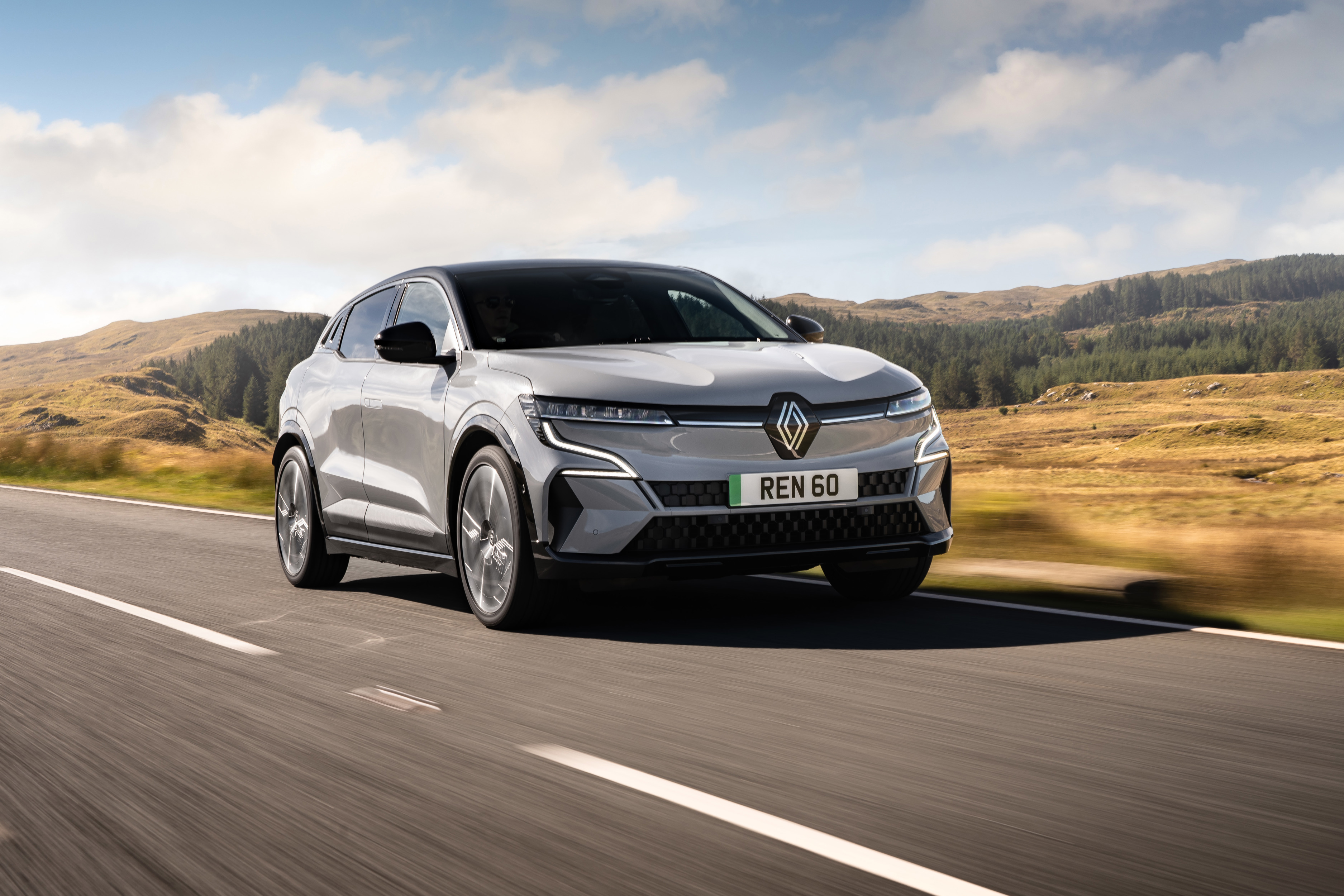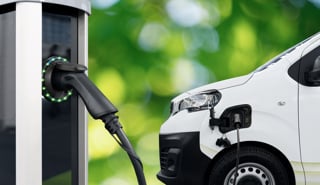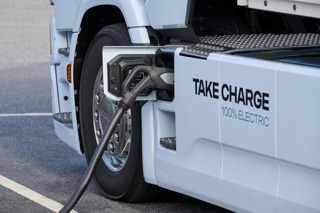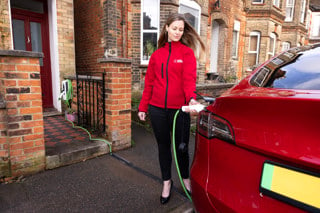A new electric car grant – worth up to £3,750 off a new battery electric vehicle (BEV) – has been confirmed by the Government.
To qualify for the £650 million scheme, electric cars must have a recommended retail price (RRP) of £37,000 or less, with two levels of grant available depending on the carmaker’s sustainability standards.
The ‘greenest’ vehicles in band one will receive up to £3,750, with band two vehicles receiving up to £1,500.
UK-made vehicles, such as the Nissan Leaf, will not qualify for higher grants simply because of where they are built, contrary to earlier reports, with all cars “assessed under the same framework”, said the Department for Transport (DfT).
The electric car grant (ECG) requires manufacturers to have committed to a verified science-based target (SBT) and have embodied carbon scores below a certain threshold.
Vehicles made by manufacturers who have not set an SBT will not be eligible for the scheme, says the DfT.
Discounts will be available on qualifying cars as soon as manufacturers successfully apply for them to be part of the grant scheme from Wednesday (July 16).
A list of qualifying models is expected to be published in the coming weeks, but the DfT said that if manufacturers are confident their application will be successful, sales from before formal application approval would be eligible for the grant, provided they comply with all aspects of the scheme and the application was subsequently approved.
Consumers will not be required to fill in any additional paperwork to receive the grant; all administration is handled between vehicle manufacturers, dealerships and the Government.
“The return of Government support for the purchase of EVs is a clear signal to consumers that now is the time to switch,” Mike Hawes, SMMT
The previous plug-in car grant (PiCG) was scrapped in 2022, under the Conservatives, at which time it was worth up to £1,500 off a new plug-in vehicle.
Transport secretary Heidi Alexander says that the new EV grant will help the UK’s automotive sector “seize one of the biggest opportunities of the 21st century”.
“We're backing British drivers, British jobs and British growth,” she added.
The Government will hope it stimulates private sales of new EVs, which have failed to match the levels seen in the fleet sector, and are needed for manufacturers to hit zero emission vehicle (ZEV) mandate targets.
Private BEV uptake has fallen 10.8% year-to-date, with fewer than one in five new fully electric cars going to private buyers.
Registrations of new EVs currently account for a 21.6% market share, remaining significantly behind the 28% mandated for this year.
Mike Hawes, chief executive of UK automotive trade body, the Society of Motor Manufacturers and Traders (SMMT), said: “The return of Government support for the purchase of EVs is a clear signal to consumers that now is the time to switch.
“Rapid deployment and availability of this grant over the next few years will help provide the momentum that is essential to take the EV market from just one-in-four today, to four-in-five by the end of the decade.”

Discounts on EVs cost carmakers in region of £4bn in 2024
The industry support will be in addition to the “substantive subsidies” already provided by manufacturers, says Hawes.
The SMMT estimates that discounts on EVs cost carmakers in region of £4 billion in 2024.
He added: “Taken with recent announcements regarding infrastructure investments and the Industrial Strategy, the UK has the opportunity to maintain its position as a leader in both the manufacture and sale of zero emission vehicles.”
Threat to used electric vehicle values
Toby Poston, chief executive of the British Vehicle Rental and Leasing Association (BVRLA), welcomed the “generous” grant, believing it will boost uptake in the retail market.
However, he warned that it could have “serious repercussions” for the used EV market, where he says, “rampant depreciation already has red warning lights flashing”.
The average used EV price has fallen 46% between 2021 and 2024, compared to 19% for cars with an internal combustions engine (ICE), according to the BVRLA.
Its recently released annual Road to Zero report, claimed that the UK’s EV future hangs in the balance, with used values “falling relentlessly”, costing the fleet and leasing sector hundreds of millions of pounds.
Without incentives to help stimulate the used market alongside the new EV market, the BVRLA is concerned the electric car grant could put further downward pressure on residual values (RVs).
Poston explained: “Further stimulating new EV registrations without supporting the used market risks creating an even greater supply/demand imbalance, putting even more pressure on fast deflating second-hand values.
“The resulting losses will erode confidence and result in higher finance costs for new EVs, eliminating much of the benefit from the original grant.”
With the Government setting the qualifying threshold for the electric car grant at £37,000, it will also do nothing to reduce the impact of the expensive car supplement, which EVs costing more than £40,000 have been subject to for the first time since April.
It imposes an additional annual fee of £425 for five years, beginning from the second year of registration, on top of the standard rate of vehicle excise duty (VED).
Electric cars priced at £37k or less
While manufacturers cut prices to keep their EVs under the expensive car supplement threshold, prices could be cut again to qualify for the electric car grant.
Those electric cars currently priced at £37,000 or less, however, include a wide range of vehicles such as the Renault Megane E-Tech and Renault 4 E-Tech, Kia EV4, Omoda E5 and Skoda Elroq.

Edmund King, AA president, welcomed grant’s return to help drive the uptake of EVs. “A grant of up to £3,750 is to be celebrated and we urge drivers to take full advantage of this offer,” he added.
The £650m fund, which will be available until 2028/29, comes on top of £63m in Government funding to boost charging infrastructure, announced on Sunday (July 13).
The DfT allocated £25m for local authorities to install cross-pavement technology, which enables cables to run safely beneath pavements and allow roadside charging from a domestic energy source.
A further £30m has been earmarked to help fleets develop depot charging facilities and £8m will be used to power electric ambulances and medical fleets across more than 200 NHS sites.
RAC head of policy Simon Williams said: “Together, these initiatives should mean more drivers than ever start benefitting from the lower costs of running an electric car.”
Conditions for electric car grant eligibility
The electric car grant offers banded grant levels for vehicles priced at £37,000 or below, with eligibility criteria based on the sustainability of vehicle manufacturing.

The highest grant, available for cars with the lowest carbon emission scores, is £3,750. The second level of grant is £1,500.
To be eligible vehicles must meet the following technical standards, as a minimum: be an M1 passenger vehicle (used for the carriage of passengers); produce 0g CO2/km at the tailpipe; have a minimum battery range of 100 miles (WLTP); and have a battery or fuel cell, used to drive the vehicle’s propulsion system with an acceptably low rate of degradation.
It must also have a warranty that guarantees the following:
- In respect of any traction battery, hydrogen fuel cell stack or hydrogen tank and electric drivetrain, a warranty period of at least 8 years, or a distance of at least the first 100,000 miles, whichever is reached first.
- In respect of any traction battery, providing for replacement of the battery if it falls below 70% capacity during the first 8 years.
- In respect of any fuel cell, the fuel stack must maintain at least 90% of its rated voltage output for the initial 5 years.
- In respect of the remainder of the vehicle, covering a warranty period of at least 3 years, or a distance of at least the first 60,000 miles, whichever is reached first.
Manufacturers must hold a verified Science Based Target and the carbon emissions incurred in vehicle assembly and battery cell production locations must be below certain thresholds.
The Vehicle Certification Agency (VCA) will assess the vehicle’s technical criteria and Office for Zero Emission Vehicles (OZEV) will assess the vehicle’s environmental criteria.
New variants of a vehicle that is already eligible for the grant will not automatically be eligible.
A variant of a vehicle that requires new type approval documentation will need to be approved separately.
The DfT says it aims to process applications as quickly as possible in the order they are received and aims to make a decision within a calendar month, from the time all documents are received.
Read more about vehicle eligibility criteria.

























Login to comment
Comments
No comments have been made yet.